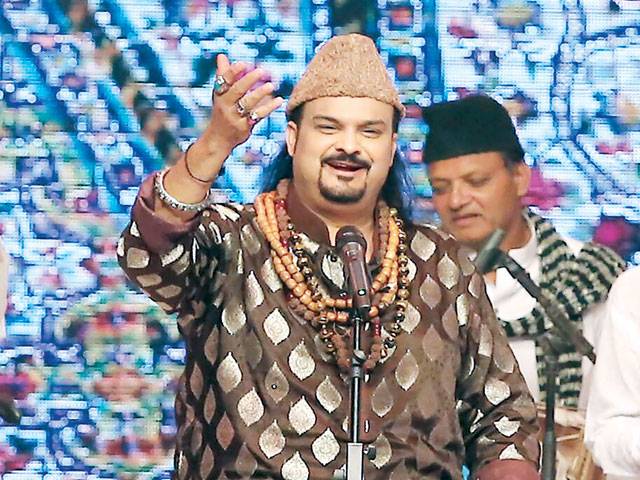KARACHI - One of country’s best known Sufi musicians was target-killed in Karachi on Wednesday, triggering an outpouring of grief over what police described as an "act of terror".
Amjad Sabri, aged around 45, was travelling by car from his home in the city's eastern Korangi area to a television studio for a Ramazan programme, when a motorcycle pulled up alongside the vehicle and two attackers opened fire, Farooq Sanjarani, a police officer said.
Officials said two gunmen shot at the windscreen of Sabri's car as it drove off a bridge in the congested Liaquatabad area around 3:30pm, and a relative travelling with him, Saleem Sabri, was also injured.
"Sabri, who was driving, expired on the way to Abbasi Shaheed Hospital," police surgeon Rohina Hasan said. "He was shot three times - in head, face and chest."
Saleem did not receive any bullet but was injured by the pieces of shattered glass. He was discharged from hospital at night.
Local sources said a woman passerby namely Maryam, who works as a nurse at Ziauddin hospital, was also injured in the attack.
The broad daylight murder comes two days after masked men kidnapped the son of a top provincial judge in Karachi, a metropolis of about 20 million people which home to Pakistan's stock exchange and central bank and is plagued by political, ethnic and sectarian violence.
Amjad Sabri was one of South Asia's most popular Qawwals, singers of Qawwali – Sufi devotional music that dates back more than 700 years.
"It was a targeted killing and an act of terrorism," Muqaddas Haider, a senior police officer said, without naming possible suspects.
Qari Saifullah Mehsud, a spokesperson of banned Tehreek-e-Taliban (TTP) Hakimullah Mehsud group, claimed the responsibility for the attack.
Qawwali is a traditional form of Islamic devotional music that is popular across South Asia with roots tracing back to the 13th century.
The Sufis are viewed as heretics by some hardline sects and Islamist groups like the Taliban who have carried out major attacks on Sufi mosques and shrines in recent years, including the 2010 bombing of the Data Darbar (shrine) in Lahore that killed more than 40 people.
Grisly mobile phone footage of the scene of the crime shot by an onlooker showed the singer's head slumped on his right shoulder and a pool of blood on the ground by the driver's side where he sat.
Paramilitary forces began a sweeping crackdown on militants in the port city in 2013, which has led to a substantial drop in overall levels of violence. But occasional acts of terrorism continue to challenge the performance of law enforcers and efficacy of the targeted operation.
On Monday, Owais Ali Shah advocate, the son of Sindh High Court Chief Justice Sajjad Ali Shah, was abducted outside a Clifton supermarket. The motive for the kidnapping was not immediately clear and security agencies could make no headway in the case.
Following Sabri’s murder, the law enforcers launched a search operation in the area and detained a few suspects for questioning.
SSP Muqaddas Haider said they believe the assailants followed the Qawaal from his residence in Liaquatabad and intercepted him at a distance of around one kilometer.
"Two armed riders in pant-shirt – one of them wearing helmet and the other covering his face with a handkerchief – made Sabri halt his car by bringing the motorcycle in front of it," said a nearby shopkeeper, who wished not to be named.
Gunmen opened fire at the car, aiming Sabri at a close range and drove off a few meters. They came back and shot multiple fires once again. After completing their swift operation the gunmen fled towards the Hassan Square, he said giving details of the incident.
Police recovered nearly half dozen bullet shells from the scene. They said usually target killers use 9mm pistols in such attacks but in this case the assassins used a 30-bore pistol. An eye-witness said that the attackers used a black bag to hide the pistol.
Sabri was first taken to a private hospital in Nazimabad from where his body was shifted to Abbasi Shaheed Hospital. His family took his body home without allowing a postmortem.
Though MQM leader Farooq Sattar and Sabri's colleagues claimed the Qawaal was receiving life threats for quite some time but police spokesperson said that they were never informed by the deceased of any kind of threat.
Sabri, the son of another legendary Qawwali singer, Ghulam Farid Sabri who died in 1994, was a fixture on national television and regularly performed on a morning show during the ongoing holy Muslim month of Ramadan.
In May 2014 he was asked by a court to respond to blasphemy charges following the broadcast of a controversial song-and-dance routine that was set to a Qawwali piece.
His killing was met with shock and condemnation. Neighbours congregated outside the singer's home to offer condolences to his relatives, while TV channels broadcast recordings of his music in tribute.






